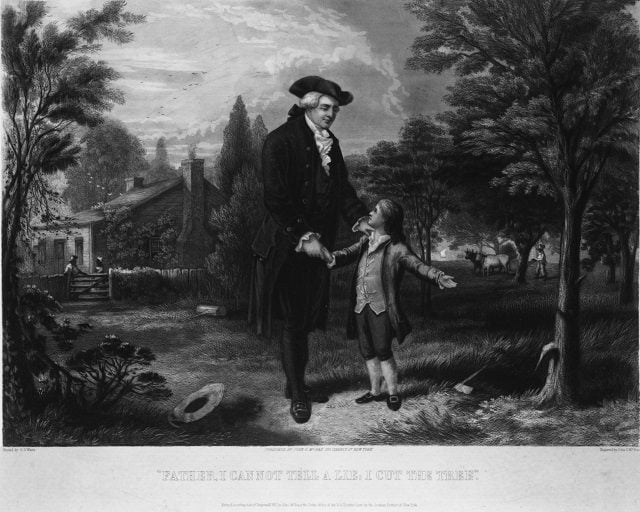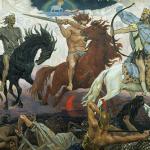
- It is universally accepted dogma of the Catholic Church that man, in union with the grace of the Holy Spirit must merit heaven by his good works . . . we can actually merit heaven as our reward . . . Heaven must be fought for; we have to earn heaven.
This is apparently from page 262. In the letter to me, Mr. McCarthy quoted this phrase in response to my saying that we Catholics do not believe that we earn heaven. The “earning” of heaven seems like strong language even when put in context of “in union with grace.” Others I have read specifically say we don’t earn heaven. I am wondering if there is a larger context to this quote or if this is a misquote or if this Matthias Premm is just plain wrong.
I replied:
This is easily explained in context. I will give you that below. First, though: some preliminary observations. As usual, McCarthy (along with many other Calvinist anti-Catholics) is unwilling or unable to understand the relationship of human free will to God’s grace. We believe we can cooperate with God’s grace in order to “merit.” Yet that very merit is itself completely an act of God’s grace. Here is some more relevant information to consider:
The Second Council of Orange (529 A.D.), accepted as dogma by the Catholic Church, dogmatically taught in its Canon 7:
If anyone asserts that we can, by our natural powers, think as we ought, or choose any good pertaining to the salvation of eternal life . . . without the illumination and inspiration of the Holy Spirit . . . he is misled by a heretical spirit . . . [goes on to cite Jn 15:5, 2 Cor 3:5]
Likewise, the ecumenical Council of Trent (1545-63): Chapter 5, Decree on Justification:
. . . Man . . . is not able, by his own free-will, without the grace of God, to move himself unto justice in His sight.
Canon I on Justification:
If anyone saith that man may be justified before God by his own works, whether done through the teaching of human nature or that of the law, without the grace of God through Jesus Christ; let him be anathema.
The existence of a measure of human free will in order for man to cooperate with God’s grace does not reduce inevitably and necessarily to Semi-Pelagianism, as Luther, Calvin, and present-day Calvinists wrongly charge. The Catholic view is a third way. Our “meritorious actions” are always necessarily preceded and caused and crowned and bathed in God’s enabling grace. But this doesn’t wipe out our cooperation, which is not intrinsically meritorious in the sense that it derives from us and not God . . . Second Orange again:
The reward given for good works is not won by reason of actions which precede grace, but grace, which is unmerited, precedes actions in order that they may be accomplished meritoriously.
Catholic theologian Ludwig Ott describes the Catholic view:
As God’s grace is the presupposition and foundation of supernatural good works, by which man merits eternal life, so salutary works are, at the same time gifts of God and meritorious acts of man. (Fundamentals of Catholic Dogma, Rockford, Illinois: TAN Books, 1974 [orig. 1952], 264)
St. Augustine wrote:
What merit of man is there before grace by which he can achieve grace, as only grace works every one of our good merits in us, and as God, when He crowns our merits, crowns nothing else but His own gifts? (Ep. 194, 5, 19; in Ott, 265)
The Lord has made Himself a debtor, not by receiving, but by promising. Man cannot say to Him, “Give back what thou hast received” but only “Give what thou hast promised.” (Enarr. in Ps 83, 16; in Ott, 267)
The concept of merit and its corollary reward is well-supported in Scripture (Mt 5:12; 19:17, 21, 29; 25:21; 25:34 ff.; Lk 6:38; Rom 2:6; 1 Cor 3:8; 9:17; Col 3:24; Heb 6:10; 10:35; 11:6; 2 Tim 4:8; Eph 6:8).
So, with that background, let’s look at the Premm quote (Dogmatic Theology for the Laity, Rev. Matthias Premm, Rockford, Illinois: TAN Books and Publishers, 1977 [orig. 1967, by the Society of St. Paul] in broad context (pp. 261-264 — emphasis in original — , with McCarthy’s citations bracketed and in blue):
In discussing the work of the Holy Spirit, we have seen that he sanctifies the world. We have shown how he sanctifies each individual [p. 262] soul by his actual and sanctifying grace, and his other gifts. Man, for his part, in order to arrive at full sanctification, must cooperate with the grace of the Holy Spirit through faith, hope, love of God and neighbor, and prayer; but he must also perform other ‘works.’ [It is universally accepted dogma of the Catholic Church that man, in union with the grace of the Holy Spirit must merit heaven by his good works]. These works are meritorious only when they are performed in the state of grace and with a good intention . . .Through these and similar works [we can actually merit heaven as our reward]. There are few truths so infallibly attested by Scripture. Christ himself has promised: ‘Rejoice and be glad, for your reward is great in heaven’ (Matt 5:12) . . .
[Premm goes on to cite 1 Cor 3:14; Heb 10:35; 2 Cor 9:6; Matt 16:27; [p. 263] Mk 9:41; Heb 6:10; Matt 20:4; 2 Tim 4:6-8]
. . . . The Catholic Church was right in maintaining against Luther, at the Council of Trent, that heaven is merited by our good works, because this is the clear teaching of revelation. “We have shown that according to Holy Scripture the Christian can actually merit heaven for himself by his good works. But we must realize that these works have to be performed in the state of grace and with a good intention . . .
Jesus himself tells his disciples: ‘I am the vine, you are the branches. He who abides in me (by the state of grace), and I in him, he it is that bears much fruit (for heaven). If a man does not abide in me (by mortal sin) . . . he can do nothing’ – he can bear no fruit for heaven; just as the branch that is cut off from the vine cannot produce any grapes.
By sanctifying grace we are children of God. Only by sanctifying grace do we have a right to heaven as our heritage. By purely natural good acts, such as even the sinner can perform, heaven cannot be merited as a reward; we must be in the state of grace, a child of God. Only after human nature has been united to God by grace and raised up above it’s own nature can good acts, which proceed from this supernaturally elevated nature, be directed towards the possession of God in the hereafter. Only in this way can we merit the vision of God in heaven, since it completely surpasses the powers of our pure human nature.
By sanctifying grace we become living members of the mystical body of Christ, one with Christ our Head. Thus our acts become acts of Christ, who, in an incomprehensible way, is living and working in [p. 264] his members. Through this intimate union with Christ, our Mediator before the Father, we merit the happiness of heaven.
Finally, sanctifying grace makes us temples of the Holy Spirit, who compels us to good works (Rom 8:14). St. Francis de Sales writes that the Holy Spirit performs good works in us with such consummate skill that the works belong more to him than to us. He works with us and we work with him. In this activity we use our free will. By our free will we submit all our human activity to the grace and will of God. By this act of reverence and worship, our good acts redound to the glory of God. Our will could also take a stand against God’s will, and commit sin.
[Heaven must be fought for; we have to earn heaven]
I don’t see the preceding quote anywhere in the immediate context (I may have missed it), but it is entirely consistent with Premm’s other statements, and the understanding of merit and salvation outlined above. Thus, the meaning of the passage is quite different in context. Premm is absolutely orthodox. By isolating sentences (the classic and quintessential anti-Catholic methodology) which emphasize man’s cooperation and effort, it appears that McCarthy had hoped to leave a false impression that we believe we can get to heaven on our own power, pulling ourselves up by our own bootstraps, without God’s enabling grace. But this is the heresy of Pelagianism, which both Catholic dogma and Premm (even in immediate context) clearly condemn.
This is, therefore, apparently deliberate misrepresentation on McCarthy’s part, and that is a serious sin — a violation of the Ten Commandments and even basic pagan and secular ethical precepts. Whatever McCarthy or other anti-Catholics think of our theology, their own Christian tradition (as well as Jesus Himself) condemn them for slander and lying, whether we are Christian “brothers” or not, in their thinking. As we indeed are their brothers in Christ, their sin is all the greater. McCarthy’s polemical anti-Catholic video has also been clearly shown by Catholic apologetics magazine This Rock to be slanderous and grossly inaccurate. Let us hope and pray that he will repent, for his sake, and for the sake of the thousands he is leading astray.
James 3:1 (RSV) Not many of you should become teachers, my brothers and sisters, for you know that we who teach will be judged with greater strictness.
***
(originally 1997)
Photo credit: George Washington, as a boy, telling his father Augustine Washington that it was he who cut down the cherry tree. This lithograph was engraved in 1867 by John C. McRae after a painting by G. G. White. [public domain / Wikimedia Commons]
***













